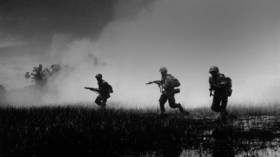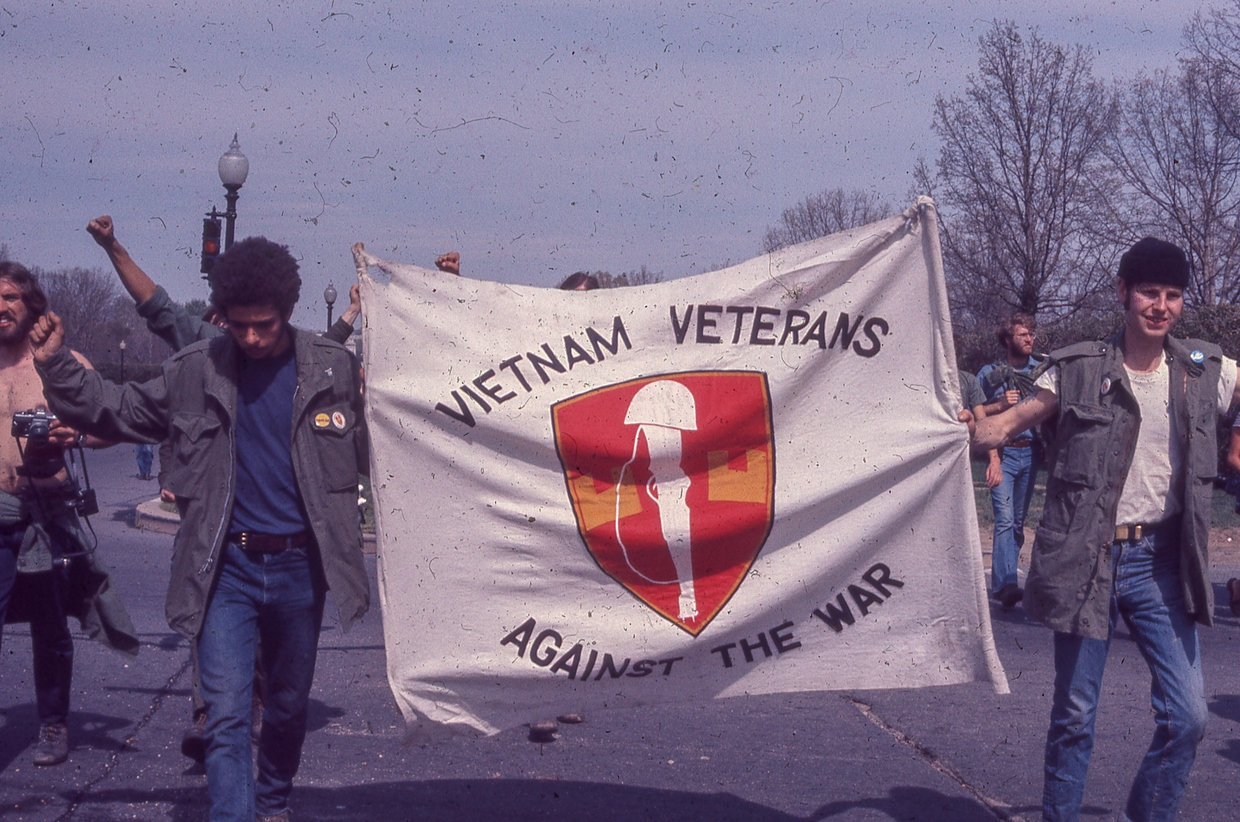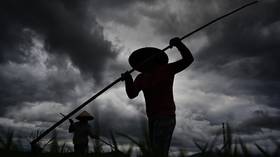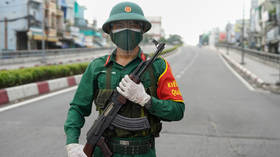'I couldn't comprehend why we were there': Many Americans hated the Vietnam War but then forgot about it
Why did the US pacifist movement peak during Vietnam and then perish?

In contrast to modern conflicts, the Vietnam War attracted the wrath of the political left, which campaigned vehemently against it. The outrage even led to attacks on veterans. On Vietnam War Veterans Day, almost half a century after the last US troops left the country, RT tries to understand – what was it about this particular conflict that struck a nerve?
If America’s soul becomes totally poisoned, part of the autopsy must read ‘Vietnam.’
– Martin Luther King Jr., 1967
Aside from it being the hottest day of his life, Avery ‘Boots’ Jackson remembers March 15, 1969 as the day he narrowly escaped death in the jungles of Vietnam.
Seated inside a US Army transport helicopter with 11 other soldiers, the 19-year-old recruit watched in silence as the lush forest canopy sped past below him, almost close enough to touch, as the machine raced towards the designated drop zone in southern Vietnam just miles from the Cambodian border.
“It was over 100 degrees that day,” Jackson recollected via email. “I actually felt sort of grateful for the air blowing through the cabin of the helicopter, even though I knew it was delivering us straight to hell.”
A black American from Louisville, Kentucky who never finished high school, Jackson had been drafted into the US Army nearly six months earlier. Like thousands of other American men, he found himself almost overnight as a foreigner in a foreign land, fighting against an adversary he knew almost nothing about except that his government told him it was his mortal enemy. The geopolitical details of the 10-year campaign that saw the US government fighting a proxy war on the side of South Vietnam against North Vietnam, which was being supported by the Soviet Union and China, were beyond his limited abilities at the time to appreciate.
“I really couldn’t comprehend why we were there,” he explained, “and why it was so important to kill these people who never did me any wrong.”
When the squadron of helicopters touched down in the misty jungle clearing, with the Sun still low in the morning sky, Jackson described how he and his platoon of some 40 men disembarked and scrambled for cover in the shadows of the bush. On this day, their mission was to locate a village situated three kilometers away on the Vietnam-Cambodian border and ‘neutralize’ any Vietcong that may have infiltrated the area. It was these sorts of perilous operations that had all the potential for turning into blood baths between suspicious soldiers and terrified villagers.

One year earlier, two battalions of the US Army were involved in a horrific incident that is now known to history as the My Lai Massacre, described by the historian and political scientist Bernd Greiner in his book ‘War without Fronts: The USA in Vietnam’ as “the most shocking episode of the Vietnam War.”
On the morning of March 16, 1968, during a ‘search and destroy’ operation to drive out members of the People’s Army of Vietnam, otherwise known as the ‘Vietcong,’ the unimaginable order was given amid the tumult to indiscriminately slaughter over 500 women, children and elderly. When news of the atrocity finally reached the American public over a year later, the momentum to bring a halt to the Vietnam War had already reached a crescendo.
On November 15, 1969, an estimated 500,000 people marched on Washington, DC, the largest anti-war protest in US history, the culmination of many years of anti-war agitation from all quarters of American society.
The roots of wrath
The original architects of the Vietnam War under then-President John F. Kennedy were forced to contend with more than their Soviet archrivals and the weapons and supplies they were pouring into North Vietnam. They were also forced to contend with the marginalized underbelly of American society that had inspired the civil rights movement, not to mention the ‘hippie’ counterculture phenomenon. These cultural movements make for poor bedfellows with the military industrial complex.
When the US military began its active operations in Vietnam in March of 1965, this allowed a number of artists to tap into a wave of anti-establishment rebelliousness then sweeping the nation. A number of American singers and songwriters, like Phil Ochs, John Fogerty, John Lennon, Jim Morrison and Bob Dylan, to name just a few, contributed to a pantheon of anti-war songs that eventually numbered in the thousands. In December 1964, just as the anti-war movement was lacing up its boots, the singer Joan Baez took her activism off stage as she personally led 4,000 people in an anti-war demonstration at University of California, Berkeley, where eventually 800 participants were arrested. Not to be outdone, the American actress Jane Fonda earned herself fiercely mixed reviews after she paid a visit to a North Vietnamese military unit and was even photographed sitting on an anti-aircraft gun position.
This massive counterculture movement that had been simmering below the surface of the Vietnam War for years finally erupted in August 1969 on a 40-acre piece of farmland in New York now famously known as Woodstock. It was there that Country Joe and the Fish performed before a crowd of 400,000 one of the most memorable Vietnam protest songs, ‘I-Feel-Like-I’m-Fixin’-to-Die’, which carried the lines:
Well, come on all of you, big strong men
Uncle Sam needs your help again
He’s got himself in a terrible jam
Way down yonder in Vietnam
So put down your books and pick up a gun
We’re gonna have a whole lotta fun
Meanwhile, prominent personalities, like the boxing champion Muhammad Ali, declared themselves ‘conscientious objectors’ and refused to be drafted into the war. Even more significantly, the civil rights activist Martin Luther King also denounced the war, telling one journalist that “millions of dollars can be spent every day to hold troops in South Vietnam and our country cannot protect the rights of negroes in Selma [Alabama].” Such cumulative actions helped to convince many people to burn their draft cards in protest.
On this point, more cynical voices might argue that much of the protest against the Vietnam War was primarily due to the military draft, which was responsible for sending thousands of young men into the jungles of Vietnam. After years of endless fighting with little to show for the effort, it seemed that eventually everyone would get a chance to serve on behalf of Uncle Sam in the East Asian country that few Americans could locate on a map.
On March 8, 1965, President Lyndon Johnson dispatched 3,500 US Marines to Vietnam, a number that steadily increased to more than 500,000 by 1968. In that same year, Richard Nixon was elected into the White House largely on the promise of ending the conflict. When the Republican leader balked on his word, however, opting instead to expand the fighting into neighboring Cambodia, the protests on college campuses and streets across the country surged.
The situation came to a head on May 4, 1970 when four students from Kent State University, protesting peacefully against Nixon’s move on Cambodia, were killed by the Ohio National Guard. The fatal shootings triggered outrage on campuses around the country, where millions of students had already been participating in organized strikes at some 900 campuses nationwide. By this point, the US military, suffering a severe drop in morale, was forced to withdraw the bulk of its ground forces from the theater by early 1972, while the returning veterans faced a different sort of enemy: US public opinion.
“I felt the mood in the country really changed when I had returned after completing my one-year tour in ‘Nam,” Jackson recalled. “While I did not experience any hostility personally, I heard the stories and saw the massive protests for myself. We vets were definitely not a liked bunch.”
And this begs the question: where is that same anti-war sentiment today among the virtue-signaling political left, concerned as it claims to be with ‘social justice’? Where is its determination to ‘cancel’ military aggression?
Post-Vietnam, where is the pushback?
The American people have witnessed their government carry out dozens of military conflicts since the end of the Vietnam War half a century ago – in Iraq, Libya, Syria and Afghanistan, to cite just a few hotspots – yet none of those engagements have really excited the same sort of anti-war passions. How does one account for that apparent change in attitudes and perceptions? Did the Vietnam-era protests arise from the fact that the US military was not a professional fighting force made up of volunteers, but was required instead to conscript draftees from the general population? Or were the protests the result of a unique combination of factors, like the rise of the counterculture movement mixed up with new civil rights awareness? Compared to the Vietnam years, has the American public become somewhat desensitized to US military adventures abroad?
If their answer is ‘Yes,’ then some of that blame could be attributed to the media and how they cover military operations. Consider the Iraq War, where the media largely spoke out in favor of an invasion against Saddam Hussein despite the fact that UN weapon inspectors could find no weapons of mass destruction on the ground in the Ba’athist country. If ever there were a time when the United States needed a fully committed, impartial media, this was it. Sadly, however, the fourth estate seems to have gone missing in action.
“As the drums of war beat louder,” Oliver Stone and Peter Kuznick wrote in their book, ‘The Untold History of th Unitede States’, “US media abandoned any pretense of objectivity, trumpeting the militarists and silencing the critics, who vanished from the airwaves."
“CNN, Fox, NBC, and other television networks and radio stations paraded a stream of retired generals who… were being given Pentagon talking points,” they added.
Others noticed that only after the boots were on the ground in Baghdad did the journalists seem compelled to speak out. In other words, when it was too late.
“In recent months, US news organizations have rushed to expose the Bush administration’s pre-war failings on Iraq,” the writer Michael Massie wrote in the New York Review. “Watching and reading all this, one is tempted to ask, where were you all before the war? Why didn’t we learn more about these deceptions and concealments in the months when the administration was pressing its case for regime change – when, in short, it might have made a difference?”
Perhaps the reason is that the establishment learned a real lesson from its experience in East Asia some 50 years ago where it suffered a humiliating defeat. Vietnam has been described as “the first television war,” while the tendency on the part of the media to be critical of Washington’s involvement is seen as contributing to US defeat. In 1968, Walter Cronkite, the respected anchor of CBS News, remarked – much to the consternation of the establishment – that the US and its communist foes were “mired in stalemate.” This unflattering assessment of the realities on the ground prompted President Lyndon B. Johnson to state, “If I’ve lost Cronkite, I’ve lost Middle America.”
Today, by comparison, it appears that mainstream media has become more tolerant – some would argue even supportive – of US military campaigns. Suffice it to recall in April 2017 the unexpected reaction by NBC anchor Brian Williams as he reported on the news that the Trump administration had launched a missile attack on Syria.
“We see these beautiful pictures at night from the decks of these two US Navy vessels in the eastern Mediterranean,” Williams said from the comfort of the studio. “I am tempted to quote the great Leonard Cohen: ‘I am guided by the beauty of our weapons.’ And they are beautiful pictures of fearsome armaments making what is for them a brief flight over this airfield.”
That enthusiastic response to the spectacle of hostilities breaking out in a world that is loaded down with nuclear weapons was not an isolated one.
Speaking on the very same missile launch, CNN host Fareed Zakaria remarked that because of the decision, “I think Donald Trump became president of the United States last night… I think this was actually a big moment.”
It’s important to remember that up until that moment, Donald Trump, whose presidency, it was said, was handed to him by the Russians, could do absolutely no good in the eyes of the mainstream media pundits.
On the cultural front, it is somewhat strange to observe the relative wall of silence that has greeted every war since Vietnam. And for those individuals who have tried to demonstrate ‘artistic license’ to protest against military adventures, some have paid a hefty price.
Consider what happened in March 2003 to the American country band, the Dixie Chicks, when they publicly criticized President George W. Bush at a concert in London and his plans to launch an invasion of Iraq. The reaction was swift, as radio stations stopped playing the band’s music and corporate sponsors pulled their advertisements from venues where the band was scheduled to play. That’s certainly a far cry from the days of Woodstock when being outspoken against an unpopular war was considered being on the right side of history.
Paradoxically, at a time when political progressives are reshaping and even canceling what they deem to be mean-spirited and unacceptable, the art of virtue-signaling seems to have spared the military industrial complex from censure. Have Americans become more concerned with intensely personal issues involving their sexuality, for example, and even pronoun usage, than with a distant issue of foreign war that doesn’t really touch their private lives?
“The silence today is kind of eerie and even strange,” Avery Jackson responded when asked about the reacon to war today compared to the Vietnam days. “It may sound strange to hearthis frotim an army vet, but the government needs to be confronted on such matters every single day or we’ll never stop the bloodshed.”




0 Comments:
Post a Comment
Subscribe to Post Comments [Atom]
<< Home